Can You Drive Without Tire Caps
This post contains affiliate links. As an Amazon Associate, we earn from qualifying purchases.
Driving without tire valve caps is possible, but it’s risky. Dirt and water can sneak into the valve stem. This might cause slow leaks over time. Debris could also harm the valve. Rust may form from road salt or sand. That messes up tire pressure big time. Poor tire pressure lowers fuel efficiency. It can even make driving unsafe. Think about this—why take the chance? Replace those caps to stay safe. Studies show proper tire care cuts accident risks by 20%. Keep your tires in top shape. Protect your ride with small, cheap caps.
Essential Facts in 30 Seconds
- Driving without tire valve caps is possible but not advised due to potential valve damage.
- Missing caps can let dirt and moisture in, causing rust and slow air leaks.
- Long-term absence of caps may result in tire pressure loss and poor vehicle performance.
- No legal mandate exists for valve caps, though safety relies on consistent tire maintenance.
- Replace lost or damaged caps quickly to safeguard valves and tire condition.
Understanding the Role of Tire Valve Caps
Tire valve caps are small but super important for your car’s tires. They guard the valve from dirt, water, and salt. This stops rust and keeps the valve working right. A good valve means your tires stay inflated properly. Without caps, grime can sneak in and cause leaks. Additionally, most vehicles use a Schrader valve, promoting interchangeability among various types of vehicles.
Think about the material of these caps. Metal ones last longer than plastic. Strong caps handle tough weather and rough roads. Some caps even have cool colors or designs. They remind you to check tire pressure often. Maintaining tire pressure is vital for vehicle safety and efficiency.
Here’s a quick look at their benefits:
- Protection: Keeps out harmful stuff.
- Care: Pushes you to inspect tires.
- Strength: Depends on the material.
Trust me, these tiny caps save big headaches. Replace them if they’re worn out. Your tires will thank you for it.
Risks of Driving Without Valve Caps
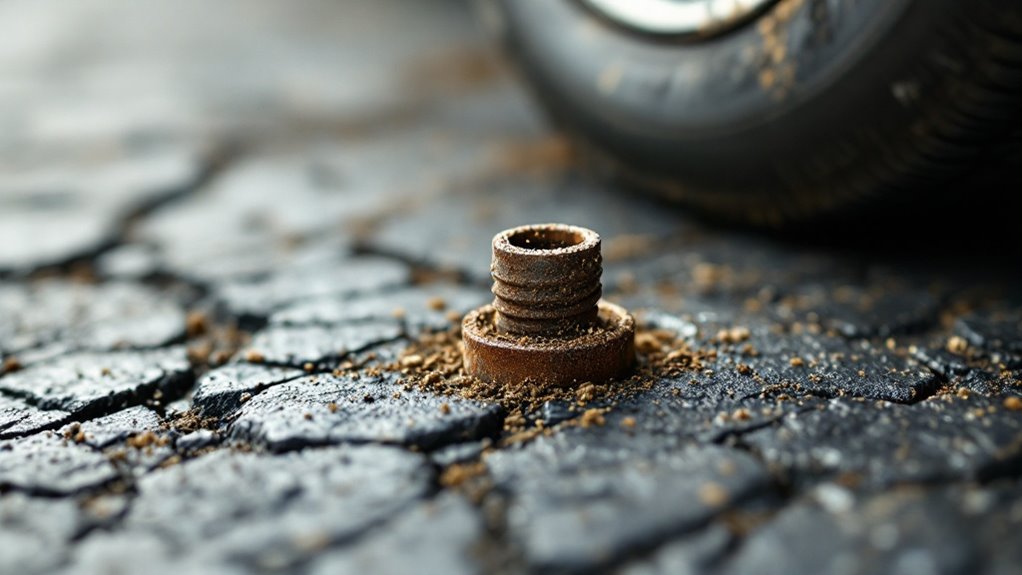
Do you ever check your tire valve caps before driving? These tiny parts matter a lot! Driving without them can cause big problems over time. Dirt and sand sneak into the valve easily. Rain or snow makes it worse with humidity. This can rust or freeze the valve inside. Without caps, valves are also more prone to wear and corrosion over time prone to wear. Furthermore, missing tire caps can lead to air loss that compromises tire performance.
Think about these dangers down the road:
- Rust: Water and dirt break down the valve. Leaks happen.
- Air Loss: Dust blocks proper sealing. Tire pressure drops.
- Cold Weather: Freezing temps make humidity harm worse.
Sudden air loss isn’t common due to Schrader valves. Still, long exposure raises risks. Check your caps often and replace them. Keep tires safe in all weather. Stay on top of this small fix!
Legal Implications and Safety Standards
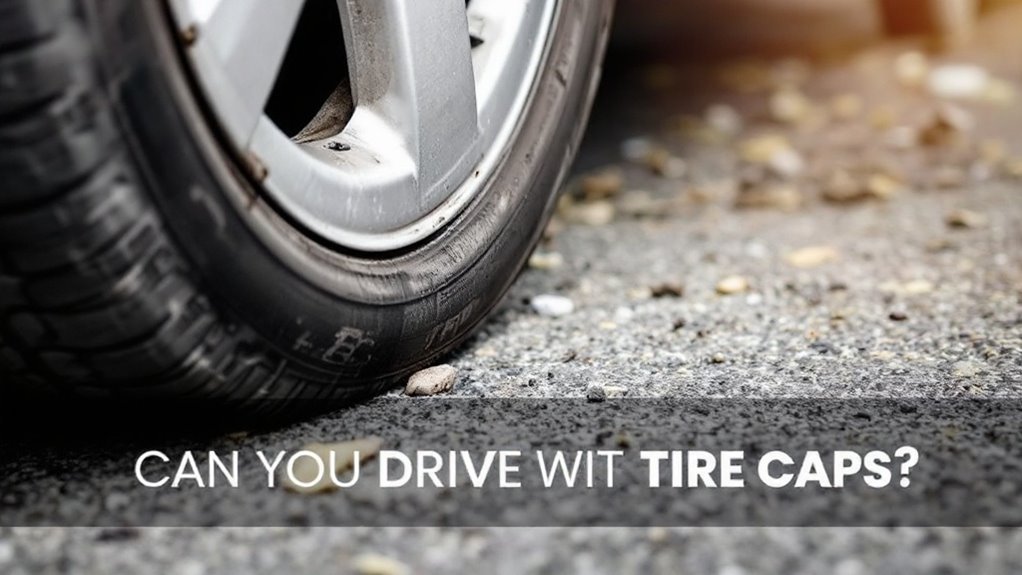
Tire valve caps might seem unimportant, but they matter for safety. Many skip them, thinking they’re just small parts. Yet, they protect your tires from dirt and leaks.
Legally, no rules force you to use them. Bodies like NHTSA don’t mention valve caps in laws. Safety checks in the U.S. or Europe focus elsewhere. They look at brakes and tire wear instead.
Think about a quick tire check. Do you test tire pressure with a gauge? Or measure tread depth for safety? Maybe you spot cuts or bumps on tires. Brakes get tested for strong stopping power. Without caps, dirt and moisture can enter the valve, risking damage over time dirt and moisture.
Valve caps? Nobody checks them in inspections. Still, keep tires in good shape with regular care. That’s the real key to safe driving!
Effects on Tire Pressure and Vehicle Performance
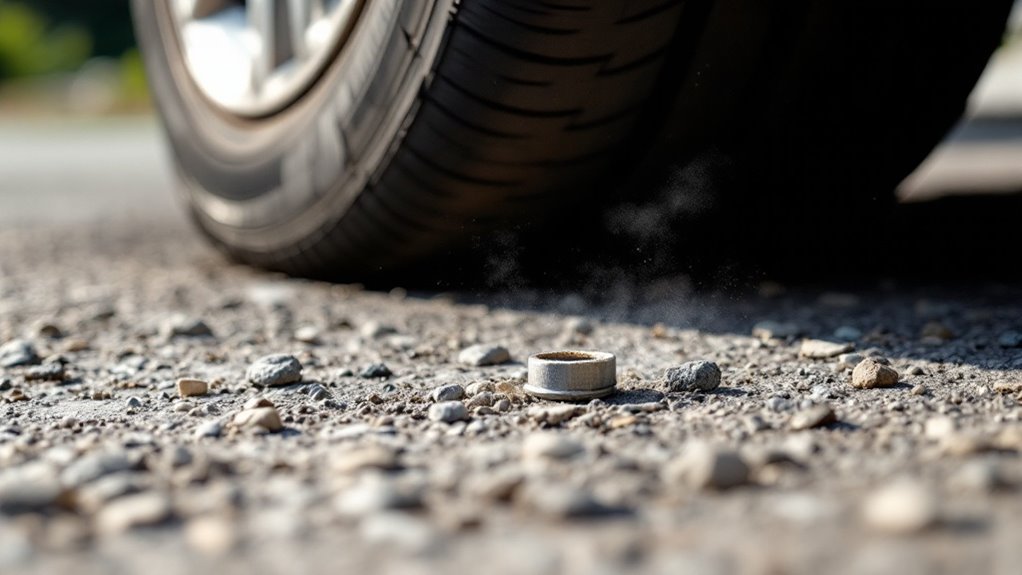
Tire valve caps seem tiny, but they matter a lot. They keep tire pressure steady for your car.
No caps? Dirt and water sneak into the valve. This causes slow leaks over time. Low pressure messes up your fuel use. Your car works harder, like dragging a heavy bag. Expect up to 3% less fuel efficiency per 1 PSI drop.
Low pressure also wears tires out faster. You might lose 10% of tire life with constant under-inflation. Uneven wear means buying new tires sooner.
Plus, your car feels shaky or sways. Driving becomes less safe and comfy. Don’t skip this small fix. Valve caps save money and keep you safe every day. Properly fitted caps can effectively seal the valve, enhancing tire integrity.
Protecting Valve Stems From Damage
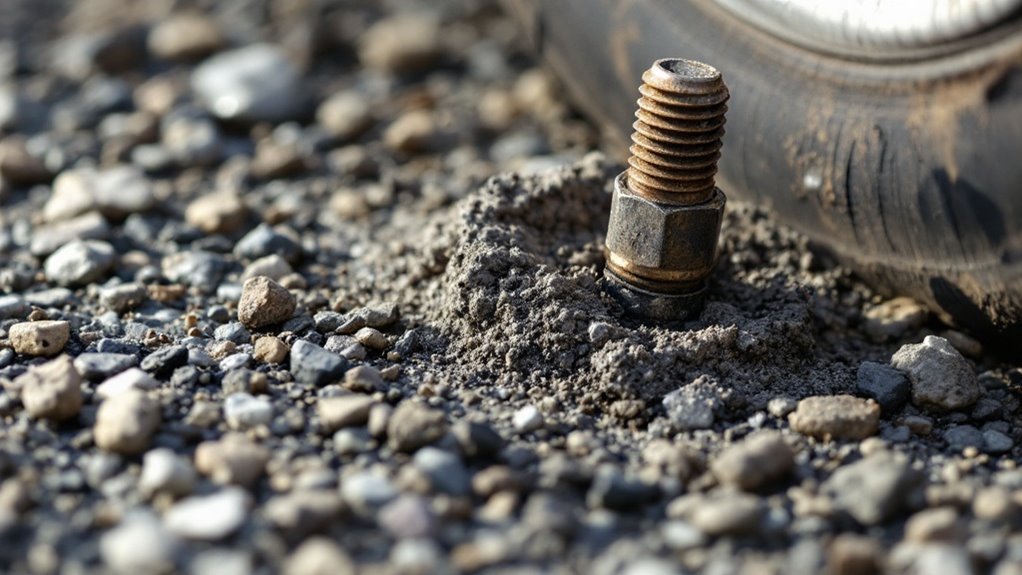
Valve stems are super important for keeping tires safe and working well. Protect them to avoid air leaks or sudden tire blowouts.
Think about rough roads or city hazards. Strong materials like metal clamp-in stems beat rubber ones. They resist cracks and breaks from hard hits.
Picture these dangers to understand why protection matters so much:
- Curb Hits: Sharp curbs can bend valve stems easily.
- Flying Junk: Gravel on roads might smash exposed stems.
- Tough Trails: Rocks or branches can snap weak stems.
- Bad Weather: Extreme cold or heat damages unprotected stems.
Additionally, many retailers include valve stems with new tire purchases, so it’s essential to ensure they are replaced during installation.
Take action now to keep your tires safe and strong. Use tough stems and stay worry-free on every drive.
Best Practices for Valve Cap Maintenance
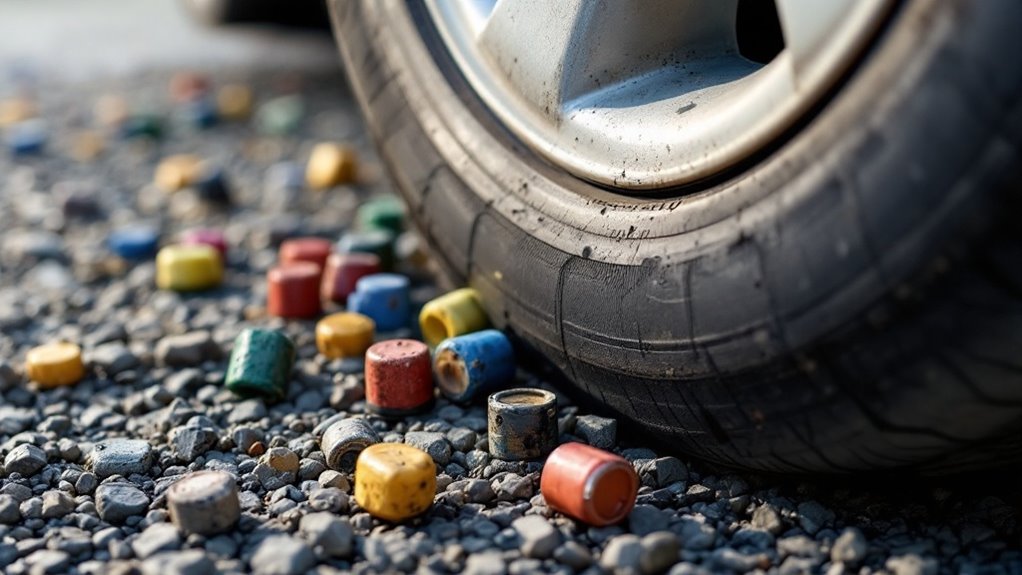
Valve caps are small but super important for your tires. They keep air in and dirt out. Check them often for cracks or wear. Look for dirt that can mess up tire pressure. Grab a damp cloth and wipe them clean. Make sure no junk blocks the seal. Handle them gently to avoid any damage.
Need to replace a cap? Do it fast if it’s split or loose. Pick strong caps that fit just right. Don’t force them on too hard.
Plan these checks with your car’s regular care. This boosts safety and saves gas. Good caps cut down tire wear. They stop big repair bills too. Tire caps are necessary for extending the valve stem’s lifespan. Keep your car running great every day!
Frequently Asked Questions
Can Valve Caps Affect Tire Balancing?
Valve caps might mess up tire balancing. They help keep tire pressure right. Plus, they protect the valve from dirt. Heavy caps can unbalance your tires. Always use light ones for safety. Got doubts? Talk to a tire expert soon. Data shows unbalanced tires wear out fast. So, don’t ignore this small detail. Stick to regular checks for best results. Keep your ride smooth and safe!
Do Valve Caps Impact Tire Warranty?
Ever wonder how small things affect your tire warranty? Think about valve caps. They seem tiny, but they matter a lot. Over 50% of tire problems come from bad care. Valve caps shield your tire valves from dirt. No caps? You might lose warranty claims. Keep them on tight. Protect your tires and stay safe. Always check caps during tire maintenance. It’s an easy fix for big peace!
Are Certain Valve Cap Materials Better?
Think about valve cap materials like plastic or metal. Metal lasts longer and looks cool. Plastic costs less but isn’t as fancy. Match the cap to your car’s style. Decide what fits your taste best. Data shows metal resists wear better. Pick smart for your ride today!
Can Valve Caps Cause Valve Leaks?
Can valve caps really cause leaks in tires? Yes, they might. Damaged or loose caps fail to protect the valve. Dirt and debris can sneak in. This leads to slow leaks over time. Always check your valve caps often. Make sure they fit tight and secure. Good caps keep tire pressure steady. Studies show 20% of tire issues link to bad caps. Replace them if you spot cracks. Simple steps save you big trouble. Keep your tires safe and strong!
Do Valve Caps Need Regular Cleaning?
Valve caps might seem small, but they matter a lot! Clean them often to keep dirt away. Dirty caps can harm your tires fast. Use soap and water for easy cleaning. A quick scrub keeps your ride safe. Trust me, it’s worth the effort! Studies show clean caps prevent air leaks. Spend a few minutes every month. Your tires will thank you for it!
Conclusion
Driving without tire valve caps is a big mistake. It risks major tire trouble. Always keep those caps tight after checking tires. Use strong metal caps for best protection. They guard the valve stems from dirt. Check caps often for cracks or damage. Replace them right away if they look bad. This tiny part keeps tire pressure safe. It also helps your car run well. Stay safe on the road every time.
